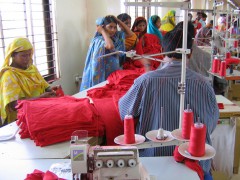Employment Generation Initiatives by Private Organizations in Bangladesh

This article was originally drafted by the Strategic Foresight Group for the newsletter “Asian Horizons” as part of the Rockefeller Foundation’s Searchlight Process. For more Searchlight content on futurechallenges.org, please click here.
In the last few years, the Government of Bangladesh has launched employment generation projects targeted at the poor, unskilled section of the population, as discussed in the August 2011 edition of Asian Horizons. There is an increasing trend of these initiatives being supplemented by private sector organizations. In the future, private sector and NGO employment projects could aid the government in extending employment opportunities to poor jobless people and help Bangladesh realize some of its demographic dividend.
Inside a garments factory in Bangladesh. (Photo by Jankie from flickr.com CC-BY-NC-SA 2.0)
In 2009, the Federation of Bangladesh Chambers of Commerce and Industry (FBCCI) launched two programs – Employment Project, and One Family-One Businessman, both aimed at providing job opportunities to the uneducated. The Employment Project looks towards posting 10,000 unemployed youth, above the age of 18 years, in bakeries and restaurants under the Bangladesh Bread, Biscuit and Confectionery Manufacturers Association and Bangladesh Restaurant Owners Association. No minimum education qualification is required for these jobs and on-the-job training is extended to new candidates. A monthly wage of USD 18 is provided along with accommodation, meals and medical facilities during the six-month training. On completion of the training, the candidates receive job placements; bakery workers earn USD 24 per month and restaurant workers earn USD 22 per month. FBCCI has also tied up with Cyber Cafe Owners Association of Bangladesh for the Employment Project. Under the partnership, persons who have at least passed the 8th grade can apply for the post of System Support Assistant in cyber cafes through the local business chamber and earn around USD 36 per month.
Bakery in Dhaka, Bangladesh. (Photo by Jonas in China from flickr.com CC-BY-NC-SA 2.0)
The One Family-One Businessman program is a new CSR initiative launched by FBCCI Foundation, which looks at creating self-employment opportunities for the poor population. Under this program, in 2010, businessmen sponsored sewing machines, irrigation pumps, computers and rickshaws for 1500 families in order to make them financially self-sustainable. In the future, expansion and scalability of such programs by FBCCI could benefit a large segment of the underprivileged population in obtaining gainful employment, particularly in urban and peri-urban areas. Similar programs are also being launched for the rural population.
In 2011, CARE Bangladesh created JITA, a for-profit independent social enterprise. JITA is a rural distribution network employing 3000 women, called Aparajitas. JITA is an extension of the Rural Sales Program in which rural women are sales agents for bottom-of-the-pyramid products marketed by international companies such as Unilever, Bata, Grameen Phone, Grameen Danone, amongst others. JITA aims to employ 12,000 rural women by 2014.
Since Bangladesh is witnessing a youth bulge, government initiatives alone are unlikely to create adequate employment opportunities for the large adult population. Innovative projects by the private sector and effective public-private partnerships could complement and add to the government efforts. Foundations may potentially aid in creating networks to bring interested actors together, and help in design and implementation of employment generation projects through partnership with private organizations.


